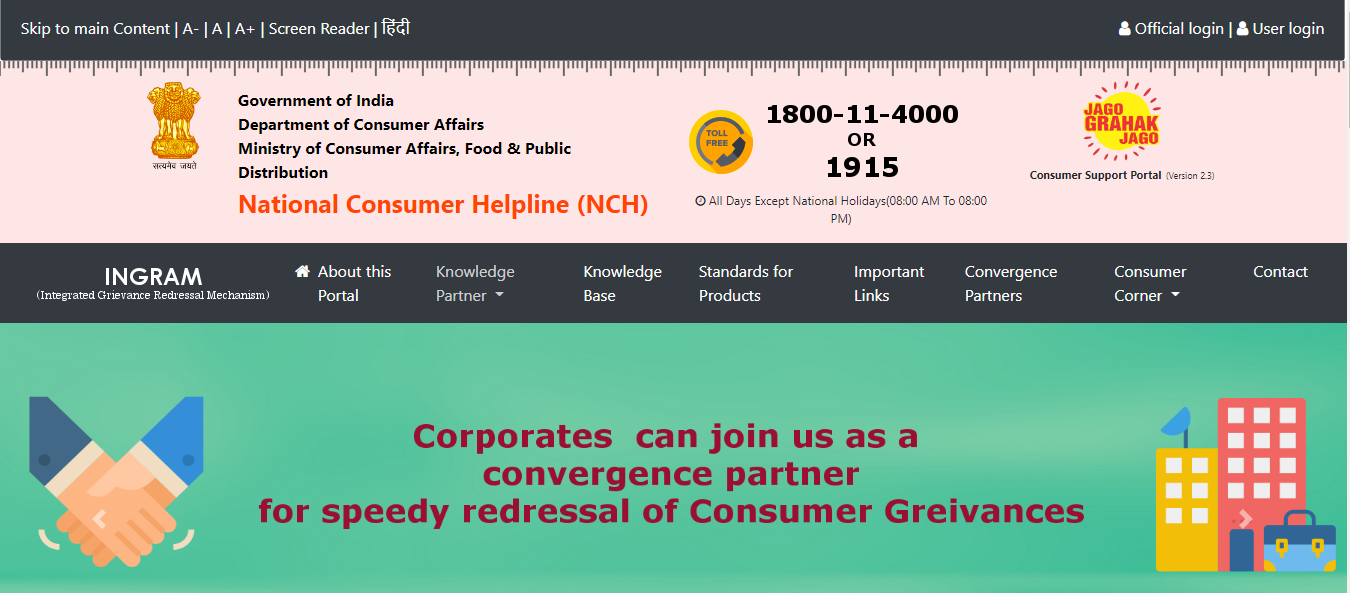The online consumer complaint filing method is considered less time consuming compared to the offline method of filing a complaint. In this article we’ll provide a step-by-step guide on the ins and outs of filing a consumer complaint in India.
What is Consumer Complaint?
Filling a consumer complaint, also known as a customer complaint, is when a consumer expresses dissatisfaction to a responsible party about a product or service. It can be a report documenting an issue in a positive sense. These complaints are typically informal and directly communicated to the company or service provider. While most consumers resolve problems successfully, some may need persistence. There are two types of complaints: instrumental, made to bring about a specific remedy, and expressive, made to express feelings without expecting a practical solution. Online complaints mostly fall into the expressive category.
The Consumer Protection Act of 1986 grants consumers a range of legal rights and safeguards. Under this Act, consumers can bring a formal complaint against a business or service provider. This specific process is commonly referred to as an online consumer complaint. If the business fails to address the issue after receiving a legal notice, a complaint is typically filed. When lodging a complaint, all essential details and supporting documents must be provided. Indian consumer courts provide clients with swift legal guidance and resolutions. This blog will clearly explain how and where to file a consumer complaint India online.
6 consumer rights have been defined under section 2(9) of the Consumer Protection Act, 2019. They are:
- Right to safety
- Right to be informed
- Right to choose
- Right to be heard
- Right to seek redress-al
- Right-to-consumer education
According to Section 2(7) a consumer is any person who:
- Buys any goods for a consideration which has been paid or promised or partly paid and partly promised, or under any system of deferred payment and includes any user of such goods other than the person who buys such goods for consideration paid or promised or partly paid or partly promised, or under any system of deferred payment, when such use is made with the approval of such person but does not include a person who obtains such goods for resale or for any commercial purpose;
or
- Hires or avails of any service for a consideration which has been paid or promised or partly paid and partly promised, or under any system of deferred payment and includes any beneficiary of such service other than the person who hires or avails of the services for consideration paid or promised, or partly paid and partly promised, or under any system of deferred payment, when such services are availed of with the approval of the first-mentioned person, but does not include a person who avails of such service for any commercial purpose.
What Are the Eligibility Criteria in Order to File a Consumer Complaint?
To file a complaint, a consumer must meet two conditions:
- The consumer has made a payment to purchase products or services in exchange for money
- The purchased product is intended for personal use, not for resale.
Eligible complainants include:
- A registered voluntary consumer association under the Companies Act or other laws.
- The government, whether at the central or state level.
- Consumers with similar interests.
- Legal heirs or relatives of a deceased consumer.
Scope of Consumer Rights in India
Consumer Rights Include
(i) the right to be protected against the marketing of goods, products or services which are hazardous to life and property;
(ii) the right to be informed about the quality, quantity, potency, purity, standard and price of goods, products or services, as the case may be, to protect the consumer against unfair trade practices;
(iii) the right to be assured, wherever possible, access to a variety of goods, products or services at competitive prices;
(iv) the right to be heard and to be assured that consumer’s interests will receive due consideration at appropriate fora;
(v) the right to seek redressal against unfair trade practices restrictive trade practices or unscrupulous exploitation of consumers; and
(vi) the right to consumer awareness;
Section 2(7) of the Consumer Protection Act India 2019 includes a statutory definition of the term ‘consumer.’ However, in general, a consumer is described as a person who purchases goods or services for consideration through any means of transaction, both offline and online.
Procedure for Filing Online Compliant
In the case of a violation of the aforementioned consumer rights or any other grievances, consumers may file a IRDA complaint portal through an online called INGRAM (Integrated Grievance Redress Mechanism) for the redressal of their grievances.
The main reason behind the launching of this online portal by the Department of Consumer Affairs is to create awareness and give some sort of advice to consumers about their rights and responsibilities.
The portal aims to redress and deal with consumer grievances in a simple and hassle-free manner.
| www.consumerhelpline.gov.in |
One-time registration is required for lodging a grievance. For registration go to the above-mentioned link
Step 1: On the top right corner of the portal there is an option called ‘user login’. After clicking the user login, you have to enter details like name, gender, e-mail ID, password, etc. to sign up.

Step 2: Using the User ID and password, log into the portal, and thereafter click on ‘Grievance Registration Form’.
Thereafter you have to fill out the form with your grievances by attaching the necessary documents (if available) and submit the same.
Step 3: After submitting a grievance using this portal, you will be assigned a unique docket number, and the grievances will be routed to the appropriate company/agency/regulator/ombudsman for prompt resolution. The actions taken will also be updated in real-time.
Once the grievances have been registered, you can track them through the site by clicking on the Track Your Grievance link.
Every grievance reported through this portal will be forwarded to the appropriate company/agency for prompt resolution. The maximum time limit to arrive at a logical resolution is 60 days. If a consumer complaint or grievance is not resolved satisfactorily, he or she may approach the consumer complaint commission/forum.
Recent Case Study: ITC v. Aashna Roy (2023)
In a recent consumer protection case in India, Aashna Roy, a model, sought ₹3 Crores in compensation for a ‘bad haircut’ at a salon in the ITC Maurya Hotel, New Delhi. She claimed that the haircut negatively impacted her modeling career and mental well-being. The National Consumer Disputes Redressal Commission (NCDRC) awarded her ₹2 Crores, citing service deficiency. However, the Supreme Court of India raised concerns about the proportionality of the compensation.
While upholding the finding of service deficiency, the Supreme Court noted the absence of material evidence supporting the woman’s claimed losses. Aashna Roy couldn’t provide proof of her modeling assignments, income, or contracts with brands. The Court emphasized the importance of compensation being grounded in concrete evidence rather than solely relying on the claimant’s request. The Court asserted that extraordinary damages require solid proof of the extent of harm suffered.
As a result, the Supreme Court set aside the NCDRC’s ₹2 Crores award and sent the case for reevaluation. Aashna Roy was directed to provide material evidence supporting her claim for ₹3 Crores. This ruling underscores the significance of evidence-based compensation in consumer protection cases. It highlights that once service deficiency is established, damages should align with the documented losses incurred by the consumer. The case emphasizes the importance of a fair and substantiated approach in determining compensation in consumer protection cases.
Conclusion
Understanding the process of filing a consumer complaint in India is crucial for asserting one’s rights and seeking resolution for grievances. By recognizing the eligibility criteria and the various entities empowered to file complaints, consumers can navigate the legal landscape more effectively. The importance of being a well-informed and empowered consumer cannot be overstated. Choose Vakilsearch for reliable, expert legal consultation and consumer litigation services. Our commitment is to stand by you, ensuring justice prevails
Frequently Asked Questions
How do I file a consumer complaint in India?
To file a consumer complaint in India, gather evidence, approach the appropriate consumer court, fill out the complaint form, and submit it along with necessary documents. you can also get it done through Vakilsearch.
What type of cases can be filed in consumer court?
Cases related to defective products, deficient services, unfair trade practices, and overcharging can be filed in consumer courts in India.
How do I register a complaint against a company in India?
To register a complaint against a company in India, contact the company's customer service department first. If the issue remains unresolved, file a complaint with the appropriate consumer forum.
Can a company file a consumer complaint against a company?
Yes, a company can file a consumer complaint against another company if it believes the other company has engaged in unfair trade practices or breached a contract.
How do I raise a complaint against a company?
To raise a complaint against a company, gather evidence, document your grievance, and contact the company's customer service department. If necessary, escalate the complaint through regulatory bodies or consumer courts.
Can I file consumer complaint online in India?
Yes, you can file a consumer complaint online in India through Vakilsearch
Is online consumer complaint legal?
Yes, online consumer complaints are legal in India. They provide an accessible and efficient means for consumers to address grievances and seek redressal.
Are consumer complaints useful?
Consumer complaints are useful as they empower consumers to hold businesses accountable for substandard products or services, ensure fair treatment, and contribute to improving overall consumer satisfaction and market integrity.


